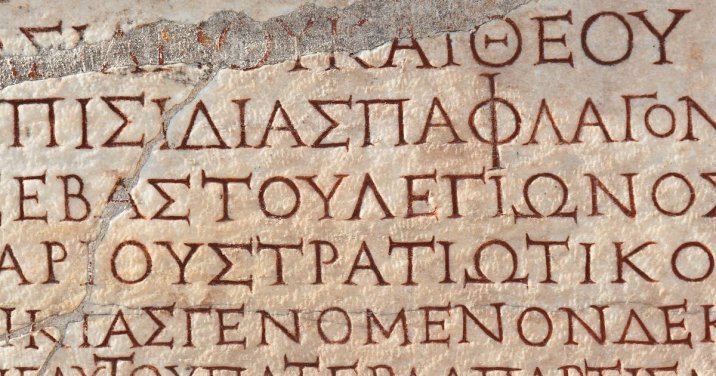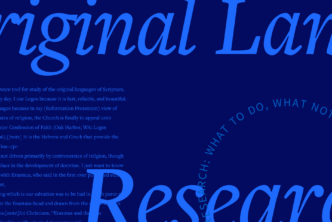Biblical Greek represents one of the most valuable skills a person can develop for studying the Bible.
The Greek of the New Testament and Septuagint (a translation of the Old Testament into Greek) is known as Koine Greek. “Koine” is a Greek word that means “common.” After Alexander the Great spread Greek language and culture throughout the known world, this Common Greek became the language of wider communication for the entire Greco-Roman world.
Learning Koine Greek not only connects you to the original text of the New Testament but also to the Septuagint (that the writers of the New Testament quoted regularly), as well as to the cultural, social, and historical world in which the good news of the gospel spread.
Greek Alphabet and Pronunciation
Greek alphabet
There’s no difference between a biblical Greek alphabet and the modern Greek alphabet. You’ll want to learn both how it’s printed in modern fonts as well as how to handwrite it.
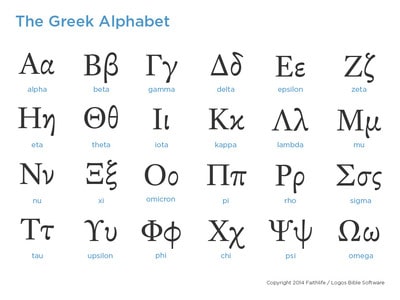
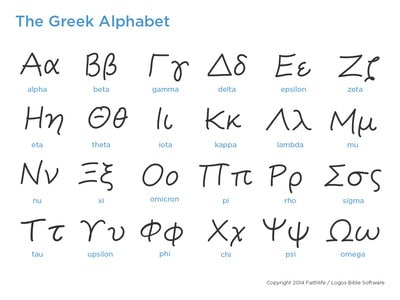
The Greek Alphabet (Lower Case)
The Greek Alphabet (Upper Case)
Logos Alphabet Tutor
Much ink has been spilled over the years over what “the best” pronunciation for Greek should be for students of the New Testament. Some people prefer Modern Greek because of its strong connection to the living Greek language. Others maintain that the traditional Anglicized Erasmian pronunciations used in most seminaries have more practical value for interacting with other Greek students. Finally, some people also choose to use a historically reconstructed pronunciation to accurately speak and read the language the way it would have sounded to the writers of the New Testament period.
None of these three choices is wrong or worse than the other. They simply prioritize different values. Whatever you choose, learning the letters of the alphabet doesn’t need to be difficult. You can hear what the alphabet sounds like in each of them.
Koine Greek Alphabet Song
Erasmian Greek Alphabet Song
Modern Greek Alphabet Song
Greek in Bible Study
Greek grammars
Learning a language, especially for the purpose of Bible study, makes grammar resources essential. Introductory grammars guide you through the basics and present the paradigms and details you need to understand basic sentences. They provide a foundation for basic concepts and vocabulary so that you can start your journey into the text of the New Testament. Intermediate and advanced grammars, then, become essential for understanding difficult topics, finding answers to questions, and making wise decisions for how complex or ambiguous Greek phrases and sentences should be interpreted.
Logos Bible Software Greek grammars and reference works
Greek lexicons
Vocabulary is a foundational part of learning a language, but there will always be words you don’t recognize. Sometimes, the historical or cultural context will influence how a word in used in ways that you might not expect. Other times, you might simply have trouble recognizing a particular form of a word. Or perhaps you need to look up a word that does not appear in the New Testament. There are different kinds of lexicons to anticipate these kinds of needs.
- Blog Post: Brill’s New Dictionary & the State of Greek Lexicography
- Blog Post: A Side-by-Side Comparison of Brill’s GE and LSJM: Which Is Better?
- Learn about how to evaluate and compare how different lexicons document the same words: Comparing Lexical Entries
Best Courses on Biblical Greek
Seminary courses
You can learn biblical Greek at most mid- to large-size theological seminaries. Wherever you live, there is a strong chance that there is a seminary somewhere close by. And if not, numerous schools provide online learning opportunities for biblical Greek.
List of Evangelical Seminaries and Theological Colleges
Self-study online courses
There is a growing number of online opportunities for learning biblical Greek. Some of these take traditional pedagogical approaches. Others have adopted new methods for language learning from the field of second-language acquisition.
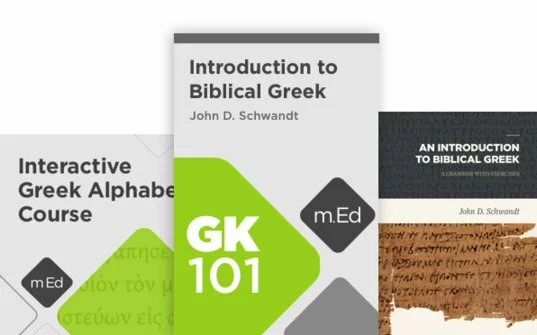
Biblical Greek: Foundational Certificate Program
Not yet ready for exegesis? Lay a solid foundation first with this certificate program that will teach you Greek grammar and vocabulary.
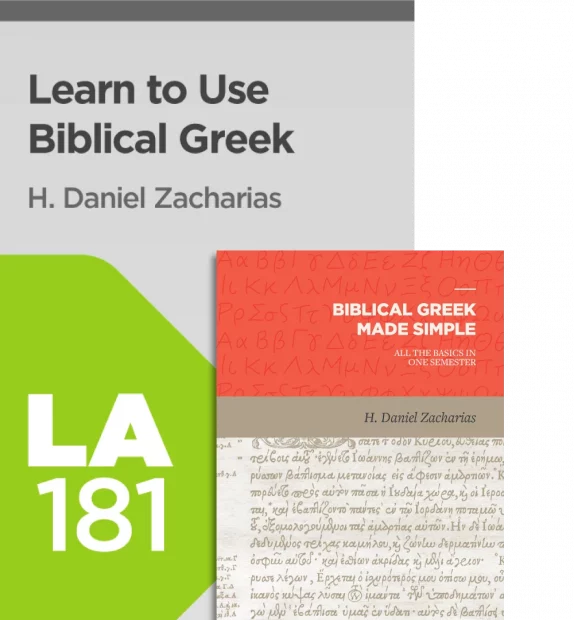
Mobile Ed: LA181 Learn to Use Biblical Greek in Logos (10 hour course)
Learn to Use Biblical Greek makes extensive use of Logos tools and resources to teach beginning Greek grammar. Dr. Zacharias introduces you to Greek grammar—nouns, indicative verbs, non-indicative verbs, participles and infinitives, and other parts of speech like prepositions, adjectives, and pronouns.
- Bill Mounce New Testament Biblical Greek
- Michael Palmer’s Online Hellenistic Greek Grammar
- Biblical Language Center
- A community of Greek scholars led by Dr. Seumas MacDonald are working on a full curriculum for Koine Greek that focuses on immersion: Lingua Graeca Per Se Illustrata.
Learn Biblical Greek
Resource:
Ongoing Study Resources
Learning biblical Greek, or any language, is a lifelong endeavor. There is always more to learn and discover. Whether you want to continue to dig deeper into grammar or expand your reading beyond the New Testament and Septuagint to the writings of the early Church, learning and using biblical Greek provides for a life of spiritual and personal growth. There are many communities online for asking questions, gaining new insight, and continuing in the language.
Resources:
- The Lecture Hall section of the Logos blog regularly discusses new books and resources for the study of Biblical Greek.
- The B-Greek forums have been a mainstay of the online biblical Greek community for more than two decades.
- The Community Forums provides a knowledge group of Logos Bible Software users who actively share and discuss using Logos for Greek study.
Conclusion
The study of biblical Greek represents a great investment for the study of the biblical text, not only for the New Testament but also of the most important translation of the Old Testament, the Septuagint—and for discovering the lives and thought of the earliest Christians.

